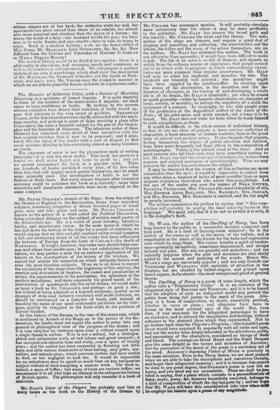Mr. PAYNE COLLIER'S Annals of the Stage, from the origin
of the Drama in England to the Restoration, forms three corpulent volumes, consisting altogether of fifteen hundred paves of small print, note and text, prose and verse. Mr. PAYNE COLLIER is known as the author of a work called the Poetical Decumeron,- being a ten days' dialogue on the subject of certain small poetry of
the Elizabethan age. He is a writer of great industry, laborious habits, and microscopic vision. In the same space in which he has laid down the history of the stage for a couple of centuries, we would engage that an able and philosophical writer would comprise a full and satisfactory detail of all the events that have influenced the fortunes of Europe from the birth of CESAR to the death of
NAPOLEON. It is right, however, that some men should forge can- non and others bore needle-eyes: in the vast subdivision of literary
labour, we may pardon a man for an exclusive application of his talents to the investigation of the history of the tetotum. We cannot but admire the venerable air which antiquity throws over even the most frivolous subjects. Were we to sit down to record the revolutions of the stage since the beginning of this century, the erection and destruction of theatres, the names and peculiarities of actors, the improvements in the pantomime, the splendour of the modern melodrame, and more especially the grand epoch of the introduction of quadrupeds into the acted drama, we could make
• as large a book as Mr. COLLIER'S, and perhaps as good a one ; but instead of being admired as a learned antiquary, quoted as an
.example of deep-read industry combined with acute criticism, we should be condemned as a compiler of trash, and, instead of boasting the name of our most aristocratic publisher on the title- page, quickly be relegated to the book-stalls in the purlieus of Covent Garden.
In this history of the Drama to the time of SHAKSPE.ARE, which is continued by Annals of the Stage up to the period of the Re- storation, the reader must not expect the author to enter into any general-or philosophical view of the progress of the drama ; and it is very rare,that he ventures upon even a critical remark upon a single dramatic author. Tnis is not a critical, but a bibliogra- phical and antiquarian work, of vast labour and great research ; it has occupied considerable time and study, over a space of twenty years ; and the author has been successful in ferreting out little facts and little notices illustrative of bear-baiting, may-poles, mo- ralities, and miracle-plays, which previous writers had been unable to find, or too negligent to look for. It would be impossible for an industrious man to spend so much time on any antiquarian subject without at least compiling a curious work. The book is, indeed, a mass of trifles; but many of them are curious trifles: we , recommend it to all who take an interest in the antiquarian history of British sports. The philosopher will only consider it a book of .materials,


























 Previous page
Previous page